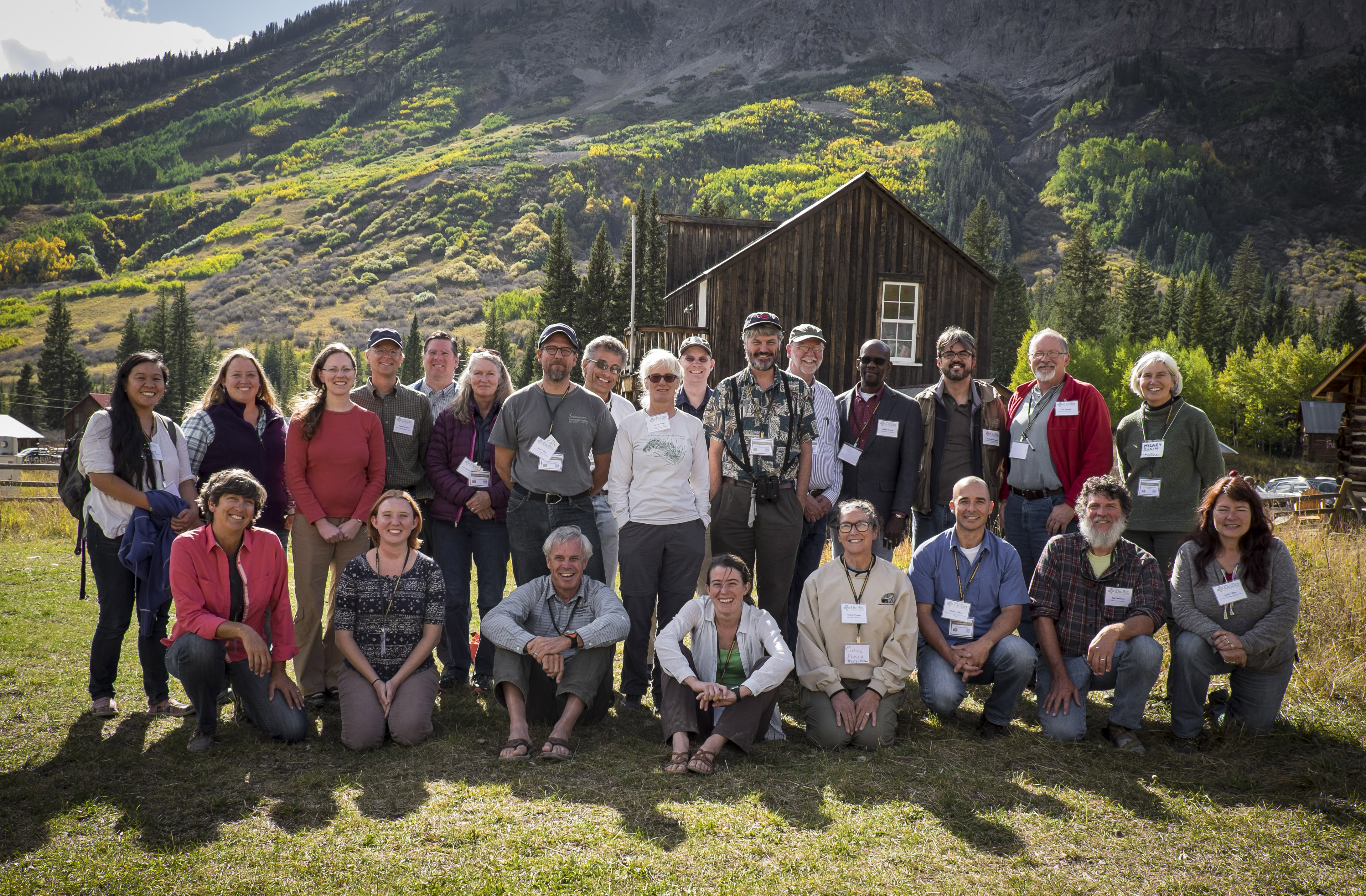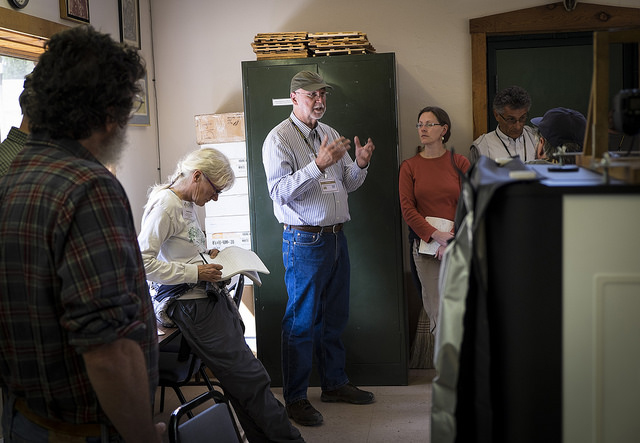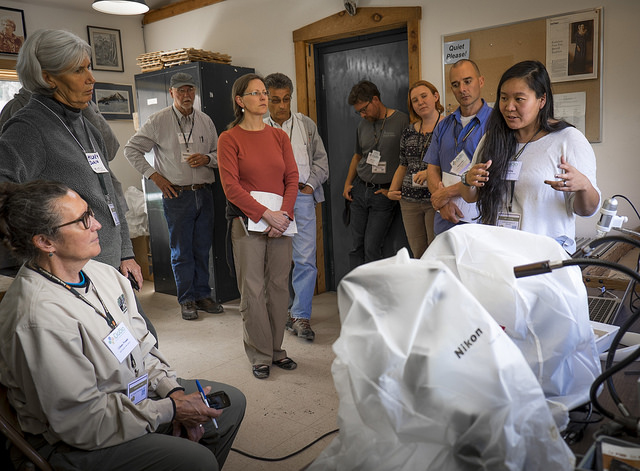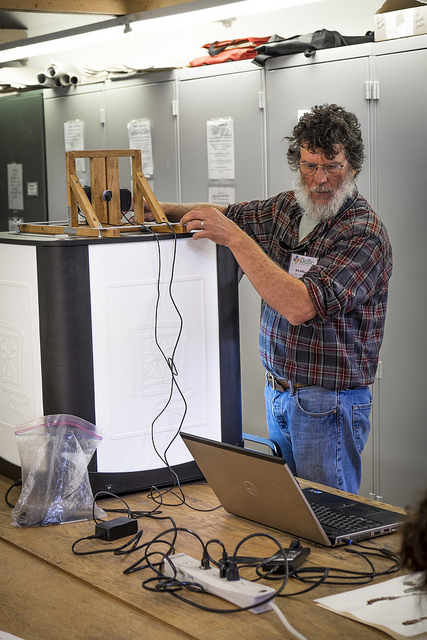
iDigBio and digitization were well represented at the 2015 annual meeting of the Organization for Biological Field Stations (OBFS), held this year at the Rocky Mountain Biological Laboratory (RMBL), just north of Crested Butte, Colorado. Based on the initiative and excellent planning of several field station collaborators, iDigBio was pleased to co-sponsor with OBFS a daylong digitization workshop preceding the conference, and an afternoon digitization seminar and discussion during the regular conference program.
 Approximately 15 participants attended the lead-off workshop, which opened with several examples of successful field station digitization programs, including those at Sagehen Creek in California, Archbold Biological Station situated along the central ridge of south-central Florida, several in the University of California Reserve System (UCNRS), Tall Timbers Research Station and Land Conservancy in northern Florida, and RMBL, our host institution. Topics for the morning also included the value of digitizing field station collections, workflow processes, education and outreach, citizen science, and the use and value of digitized data for field station research. The workshop agenda and PDF conversions of the Power Point presentations are available on the workshop wiki.
Approximately 15 participants attended the lead-off workshop, which opened with several examples of successful field station digitization programs, including those at Sagehen Creek in California, Archbold Biological Station situated along the central ridge of south-central Florida, several in the University of California Reserve System (UCNRS), Tall Timbers Research Station and Land Conservancy in northern Florida, and RMBL, our host institution. Topics for the morning also included the value of digitizing field station collections, workflow processes, education and outreach, citizen science, and the use and value of digitized data for field station research. The workshop agenda and PDF conversions of the Power Point presentations are available on the workshop wiki.
We were especially pleased that Dr. Roland Roberts, NSF program officer for ADBC and CSBR, made time to join the cast of presenters. Following his brief presentation—and the exciting interruption of a female moose who wandered past our window just as Roberts began his talk—participants were able to secure answers to numerous questions about the NSF proposal process as well as glean important information for producing competitive NSF proposals.
 During the afternoon, workshop participants relocated to RMBL’s biodiversity museum, where Rick Williams, associate professor at Idaho State University and longtime researcher and collections curator at RMBL, gave a brief tour of the lab’s collections before demonstrating the use of light boxes, cameras, and databases for digitizing herbaria, birds, mammals, and fluid-preserved vertebrates. Misha Leong, now at Cal Academy, demonstrated techniques for rapid
During the afternoon, workshop participants relocated to RMBL’s biodiversity museum, where Rick Williams, associate professor at Idaho State University and longtime researcher and collections curator at RMBL, gave a brief tour of the lab’s collections before demonstrating the use of light boxes, cameras, and databases for digitizing herbaria, birds, mammals, and fluid-preserved vertebrates. Misha Leong, now at Cal Academy, demonstrated techniques for rapid digitization of field station insect collections that she developed while at Berkeley. During her time at University of California, she organized and coordinated a SWAT team of digitizers that visited UCNRS field stations to assess and digitize station insect collections. The workflows, strategies, and imaging stations she developed have proved extremely valuable for field station digitization and collections assessment.
digitization of field station insect collections that she developed while at Berkeley. During her time at University of California, she organized and coordinated a SWAT team of digitizers that visited UCNRS field stations to assess and digitize station insect collections. The workflows, strategies, and imaging stations she developed have proved extremely valuable for field station digitization and collections assessment.
The day ended with an excellent wrap-up of reflections by David Jennings, iDigBio Project Manager, and Roberts. These reflections generated important discussion and led to a specially scheduled iDigBio lunch meeting that focused on digitization, enhancing and enlarging the OBFS digitization working group, a proposal for an NSF-sponsored grant writing workshop focused on field stations, and the launch of an OBFS team to develop a collaborative field station digitization proposal to be submitted and coordinated through one of the participating field stations. About 12 participants attended this organizational meeting.
 iDigBio also led an invited 1.5-hour session moderated by Gil Nelson, Hilary Swain (Archbold Biological Station), Erica Krimmel (Chicago Academy of Sciences), and Misha Leong (Cal Academy), which included short presentations and discussion of collections digitization strategies in various field stations. The session generated good discussion and enhanced the potential for mobilizing existing digital data from some stations and helped others with plans for launching digitization initiatives. About 15 people attended the session, including a number of attendees who were not present at the Wednesday workshop. We were especially pleased that Peter McCartney, NSF program officer for ABI, SSE and SSI, represented the foundation at the session.
iDigBio also led an invited 1.5-hour session moderated by Gil Nelson, Hilary Swain (Archbold Biological Station), Erica Krimmel (Chicago Academy of Sciences), and Misha Leong (Cal Academy), which included short presentations and discussion of collections digitization strategies in various field stations. The session generated good discussion and enhanced the potential for mobilizing existing digital data from some stations and helped others with plans for launching digitization initiatives. About 15 people attended the session, including a number of attendees who were not present at the Wednesday workshop. We were especially pleased that Peter McCartney, NSF program officer for ABI, SSE and SSI, represented the foundation at the session.
In addition to these sponsored activities, members of the iDigBio team also attended and contributed to several additional sessions relevant to our mission, including sessions on the recently launched Global Network of Mountain Observatories (GNOMO), communicating science effectively to the public, expanding metrics for assessing success, assessing educational impact of field stations, and establishing long-term research projects at field stations, cementing iDigBio's strong collaboration with the OBFS community.
All images courtesy of Faerthen Felix from Sagehen Creek Field Station. You can find more of her beautiful images from the OBFS meeting here.







